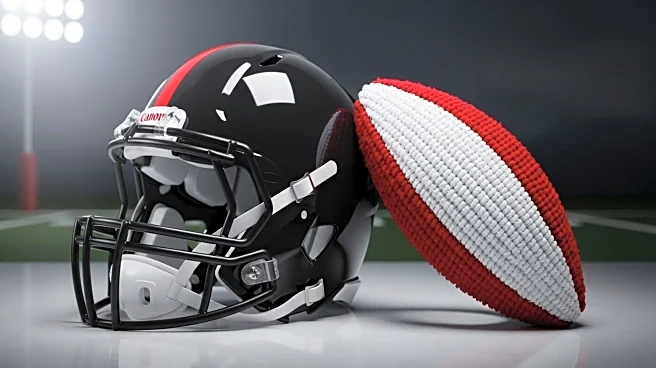What's Happening?
Dylan Raiola, the quarterback for the Nebraska Cornhuskers, has been criticized by NFL insider James Palmer for his striking resemblance to Kansas City Chiefs quarterback Patrick Mahomes, not only in appearance but also in playing style. Raiola, who faced off against the Michigan Wolverines recently, has been compared to Mahomes due to his similar mechanics and background in baseball. Despite the Cornhuskers' loss to Michigan, Raiola remains optimistic about the team's future, stating that they will come together and achieve something significant. Palmer's criticism focuses on Raiola's emulation of Mahomes, suggesting that Raiola needs to establish his own identity rather than copying Mahomes' pregame routine, haircut, throwing motion, and other attributes.
Why It's Important?
The criticism of Dylan Raiola highlights the challenges faced by young athletes in establishing their own identity in the shadow of successful professionals. Raiola's situation underscores the pressure on college athletes to perform and the scrutiny they face from media and insiders. The comparison to Mahomes, a Super Bowl-winning quarterback, sets high expectations for Raiola, which could impact his development and performance. This situation also reflects broader issues in sports where young athletes are often compared to established stars, potentially affecting their confidence and career trajectory.
What's Next?
Raiola will need to focus on developing his own style and identity as a quarterback to avoid being overshadowed by comparisons to Mahomes. The Nebraska Cornhuskers will continue their season, and Raiola's performance will be closely watched to see if he can lead the team to victories and establish himself as a unique player. The team's response to Palmer's criticism and Raiola's ability to handle the pressure will be crucial in determining his future success.
Beyond the Headlines
The situation raises questions about the role of media and insiders in shaping the narratives around young athletes. Raiola's experience may prompt discussions on how comparisons to professional athletes can impact the mental health and career development of college players. It also highlights the need for athletes to balance emulation with individuality to succeed in competitive sports environments.








